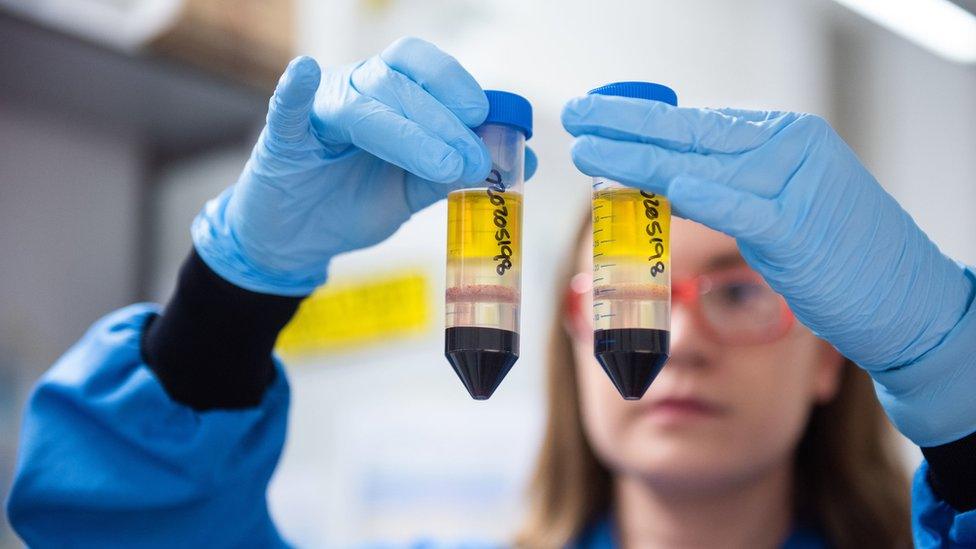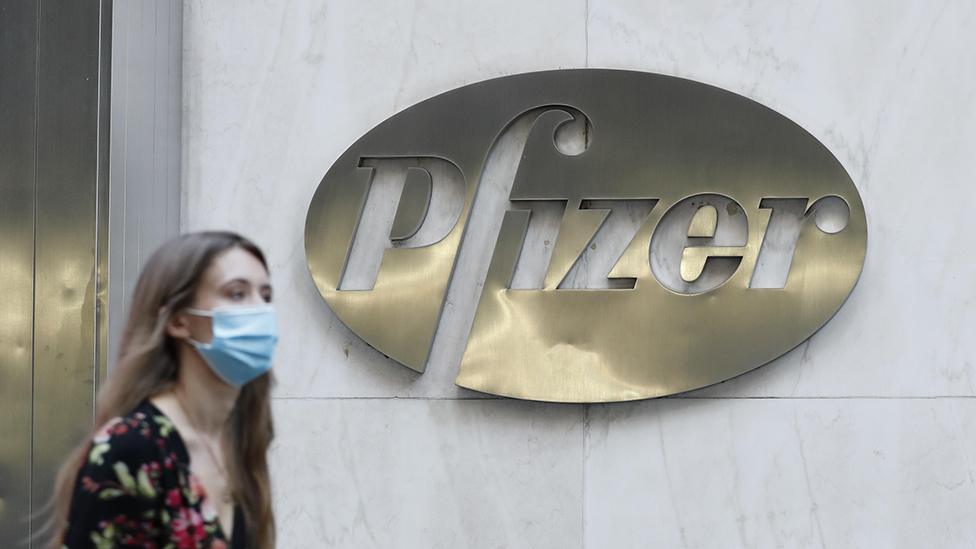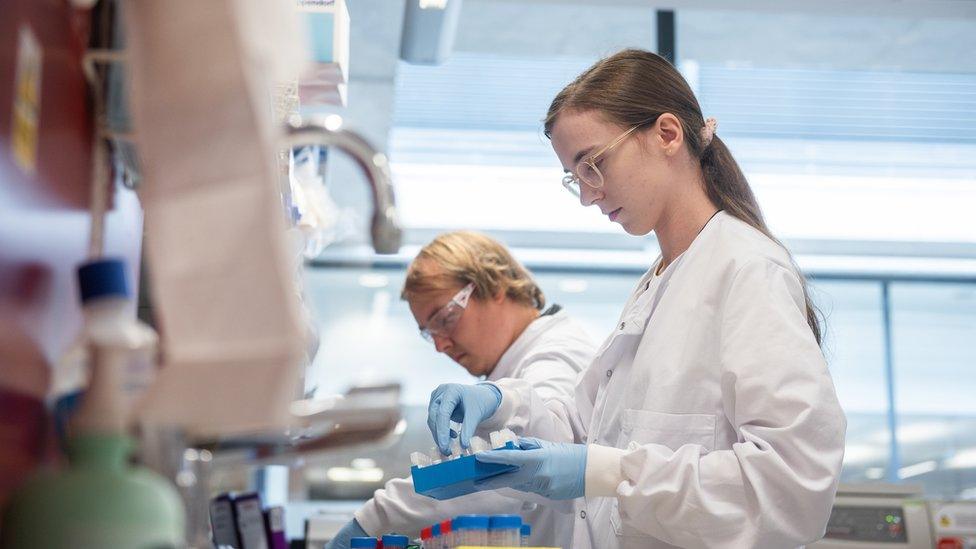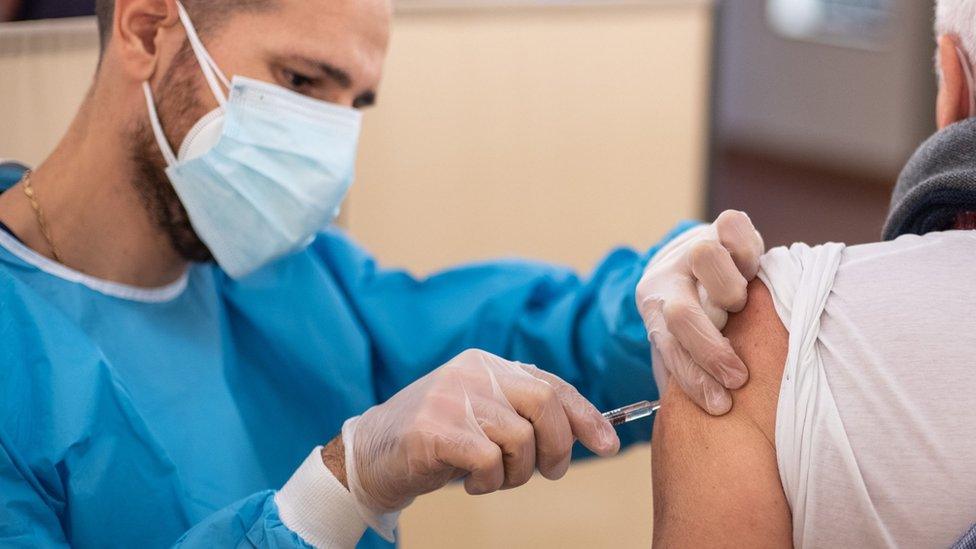Oxford Covid vaccine: Regulator asked to assess jab
- Published
- comments

The government has asked the regulator to assess the Oxford/AstraZeneca coronavirus vaccine, bringing the UK a step closer to a possible rollout.
The referral to the Medicines and Healthcare products Regulatory Agency (MHRA) marked "a significant first step" in getting the vaccine "approved for deployment", the government said.
It follows news that the jab was "highly effective" in advanced trials.
The UK government has pre-ordered 100m doses of the Oxford vaccine.
The government's latest request to the MHRA comes a week after the regulator was asked to assess the Pfizer/BioNTech vaccine.
Matt Hancock: “Our plan is working and I am more sure than ever that we will prevail together”
Health Secretary Matt Hancock said the government was working "tirelessly" to be in the "best possible position to deploy a vaccine" as soon as one was approved by the MHRA.
"We have formally asked the regulator to assess the Oxford/AstraZeneca vaccine, to understand the data and determine whether it meets rigorous safety standards," he added.
The Department of Health and Social Care said the UK would be one of the first countries in the world to receive the vaccine, if it was authorised, with AstraZeneca set to have as many as 4 million doses ready for the UK by the end of the year and 40 million by the end of March 2021.
The government has also ordered 40 million doses of the Pfizer/BioNTech vaccine - which preliminary results showed stopped more than 90% of people developing Covid-19 symptoms.
If approved, a vaccine could be rolled out from December, Mr Hancock has said.
On Thursday, AstraZeneca said it was amending its study in the US following the accidental discovery that the vaccine appeared to perform best when a half dose was given followed by a full one, rather than two full doses.
It came after multiple news outlets in the UK and US reported that there were questions over the data on how effective the Oxford jab was.
Interim data from the trial showed three efficacy levels - an overall efficacy of 70%, a lower one of 62% and a high of 90%.
The company added that it was looking to get further confidence in the 90% efficacy found among volunteers who received the lower initial dose. It said it already had enough data from the trials to submit the vaccine for regulatory approval and would be doing this soon.

How are vaccines authorised in the UK?
Regulator the MHRA assesses vaccine trial data for safety, quality of manufacture, and how effective it is in protecting people
It then advises the UK government whether a vaccine is ready to be used
It is part of the Department of Health, and employs more than 1,200 people
Independent experts on the Joint Committee on Vaccination and Immunisation decide how best to use a vaccine and who should get it first
It has drawn up interim advice on priority groups for the Covid vaccine. It also considers how many doses to use
The JCVI has about 20 members - all are experts on vaccines
Read more on vaccine safety here.

Prof David Salisbury, former director of immunisation at the Department of Health, told BBC Radio 4's Today programme that if the Oxford jab had 60% efficacy, while others had higher efficacy, then "tough choices" would have to be made.
"I think you have to think very carefully what we do with one hundred million doses of a product that isn't protecting as well as the alternative," he said.
Prof Salisbury suggested higher efficacy vaccines could be given to more vulnerable people while lower efficacy jabs could be given to under 55s.

MASS TESTING: Where is it available?
FACE MASKS: When do I need to wear one?
TESTING: How do I get a virus test?

The DHSC said the MHRA had already started a "rolling review" of the Oxford/AstraZeneca vaccine and that once the regulator received the full safety, efficacy and quality data from the company, its scientists and clinicians "stand ready to progress its assessment of the vaccine".
Prof Helen Fletcher, of the London School of Hygiene and Tropical Medicine, said: "It's not surprising if some manufacturing issues were still being ironed out when they started clinical trials but early stage trials are all about safety and the safety data we have seen has been very robust."
She added that it was important to wait for the full dataset to be published.
Laura Foster explains why the Oxford vaccine matters


- Published20 January 2021

- Published23 November 2020

- Published27 November 2020
